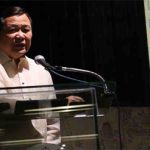Kabayan Party-list Rep. Harry Roque warned President Rodrigo Duterte about the possibility that the International Criminal Court (ICC) in The Hague may charge him for the incidents of extrajudicial killings (EJKs) in the war his administration waged against illegal drugs.
The ICC was established in 2006 to bring to justice those who are guilty of war crimes, genocide, and other crimes against humanity.
In his privilege speech on Wednesday, August 10, to commemorate International Humanitarian Law (IHL) on August 12, Roque said the ICC may investigate the killings if the organization finds them “widespread” and “systematic.”
[ads1]
“While it would be imprudent for [him] to say with certainty that President Duterte has already committed a crime against humanity, it would be a disservice to this entire nation if [he] did not warn [the President] to be careful,” Roque said.
“Neither the Rome Statute nor general international law prescribes a minimum number of victims for an indictment. So long as the ICC believes the war on drugs is ‘widespread’ and ‘systematic,’ they are likely to investigate,” he added.
“From what we can see today, it is clear that the civilian population is being attacked – news reports all around us overwhelmingly establish that hundreds of Filipinos have been killed either directly by governmental forces or with their support or tolerance. It is also clear that the President is aware that these acts are ongoing. Even without proof of a directive on his part, he has, in many instances, spoken about the use of violence against drug syndicates,” Roque said.
The lawyer and human rights advocate also said, “By definition, crimes against humanity may be committed even in times of peace, without the existence of an armed conflict.”
Roque also warned that despite Duterte being the President, thus having state immunity, it “is not an effective shield against the ICC.”
He then went on to cite leaders charged by the ICC even when they are still in power.
“The ICC has indicted leaders even during their term of power. It has done so in Kenya, Sudan, and others. Even without actual or direct participation, the President can be indicted for crimes under the principle of Command Responsibility so long as he knew that such crime was being committed, and he failed to take all necessary and reasonable measures within his power to stop such acts,” Roque said.
He added if the current administration does not change its methods of war against drugs, it would not take long for the ICC to take notice.
“The ICC does not need to wait for news about the massacre of an entire town or barangay before it investigates. If the administration does not temper the methods it has been using over the past few weeks, then it is only a matter of time before the international community turns its focus on the Philippines for justice,” he added.
Even if it is an international tribunal, Roque explains that the ICC “may step in when it is clear that the state is unwilling and unable to do (prosecute international crimes), under the aut dedere aut judicare principle.”
“In other words, half-hearted investigation efforts or the refusal to investigate and prosecute widespread and systematic EJKs constituting crimes against humanity just cannot be an effective shield against the ICC’s jurisdiction,” Roque said.
Ruben Carranza, senior associate at the International Center for Transitional Justice in New York, said that “extrajudicial killings are crimes against humanity,” as provided for by the Rome Statute.
He added, “Presidents have no immunity there.”
Sources: (tribune.net.ph, businessmirror.com.ph, newsinfo.inquirer.net)
[ads3]


